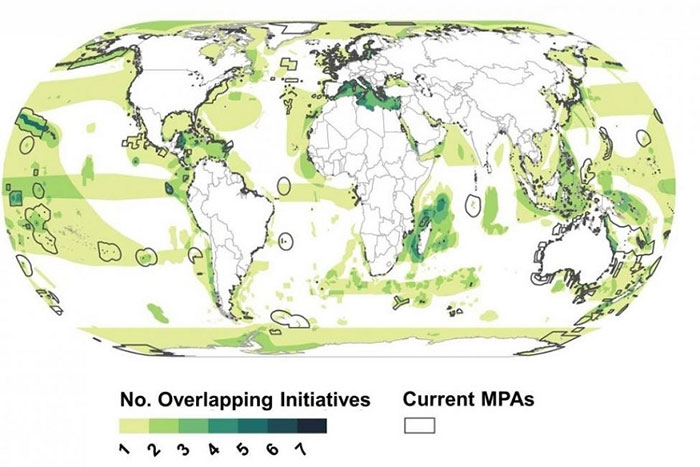Most important marine areas are not preserved
For marine biodiversity, some areas of the ocean are more important than others. In the first new study, scientists synthesized the findings of many studies to identify all the most important marine areas.
Research published in the journal Frontiers in Marine Science shows that some important marine areas remain unprotected.
Instead of leading a new effort to map important global maritime areas , the authors of the new study decided to analyze the findings of past and current studies. at, including projects of both the United Nations and non-governmental initiatives.

Most important marine areas identified by scientists are not located within marine protected areas.(Photo by Stony Brook University).
When scientists synthesized multiple surveys, they found that 55% of the ocean was identified as globally important when there was a project mapping it, about 14% of the ocean was more important because there were two to Four different mapping efforts.
Of the 14% of oceans that have a broad consensus of its importance, about 90% remain unprotected. Most important but unprotected marine areas are located in the Caribbean and the Mediterranean Sea, as well as the waters around Madagascar, the southern tip of Africa and the Coral Triangle area.
In a new report, ocean conservation science professor Ellen Pikitch, Stony Brook University said: "A large area of the ocean has been identified as important but still important by scientists and conservationists. unprotected. These ocean areas need further conservation. "
Although scientists have found a number of important maritime areas, most of these maritime areas are within the jurisdiction of nations. According to the study, the UN's goal to protect 10% of the world's oceans can be achieved through the actions of coastal states.
Comprehensive mapping efforts show that many marine protected areas have been re-established which do not coincide with the size and shape of important marine areas. Many marine protected areas provide only protection for part of an important ecosystem or range of vulnerable species.
According to the authors of the new study, their latest analysis could help guide regulators about where to expand marine protected areas, as well as where to establish new marine protected areas.
Professor Gulitch said: "This research could help guide the location of future marine protected areas to meet agreed targets in terms of quantity, quality and representation of regional networks. global marine protection. Local studies and expertise will also be needed to carry out this process. "
- Zoning plan to protect the marine environment
- The world's 20 'hot spots' of marine and lake conservation
- Phu Quoc: proposing the establishment of a 10,000ha marine reserve
- There will be the world's largest marine reserve in Antarctica
- 10 strange sea creatures in Chile's marine reserve
- Da Nang: Preserving coral reefs and marine ecosystems
- Tips to preserve some essential vegetables
- America announced the world's largest marine reserve
- Time and how to store eggs and milk
- Discover the best preserved mummy of the Egyptian dynasty
- Sea fish are increasingly exhausted due to the hot sea
- Tag the hunting animals in the Pacific
 Surprised: Fish that live in the dark ocean still see colors
Surprised: Fish that live in the dark ocean still see colors Japan suddenly caught the creature that caused the earthquake in the legend
Japan suddenly caught the creature that caused the earthquake in the legend A series of gray whale carcasses washed ashore on California's coast
A series of gray whale carcasses washed ashore on California's coast Compare the size of shark species in the world
Compare the size of shark species in the world